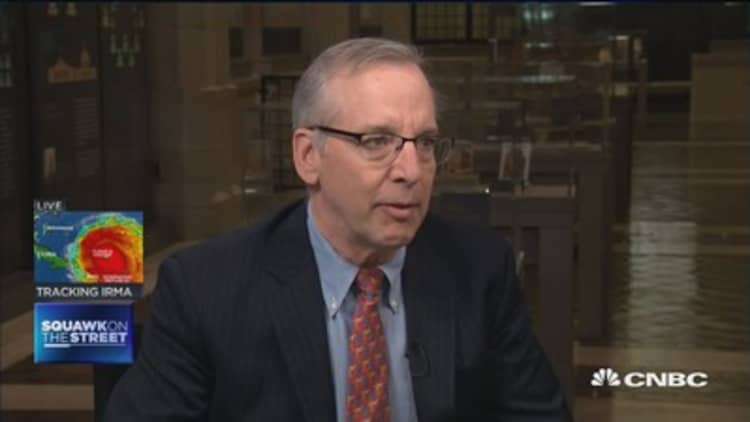
Hurricanes Harvey and Irma actually will lead to increased economic activity over the long run, New York Fed President William Dudley said in an interview.
Speaking just as Irma is about to start battering Florida as a Category 4 storm, Dudley said the initial impact in both human and economic costs will be harmful. But in the long run, economies tend to snap back from such major events.
"Those effects tend to be pretty transitory," Dudley said in a live interview with CNBC. "The long-run effect of these disasters unfortunately is it actually lifts economic activity because you have to rebuild all the things that have been damaged by the storms."
Dudley added that he didn't think the near-term economic damage would have much effect on Fed policy. He still believes the central bank will begin unwinding its $4.5 trillion balance sheet
"relatively soon" though he acknowledged that the timing of the next rate hike is up in the air.
In their most recent projections, Fed officials indicated one more rate hike this year on top of the two they already approved earlier. However, weak inflation data have led to dovish statements from Fed speakers, leading market participants to believe the next hike won't happen until well into 2018.
"In terms of increasing short-term rates, I think it's going to depend on how the economy evolves," he said. "On one hand, the economy is growing above trend. That implies that we need to continue to remove accommodation. On the other hand, inflation is below our target, farther below our target than we anticipated, and we also have very easy financial conditions.
"I think it's too soon to judge exactly the timing of when the next rate hike might occur. But I think the path is clear that of short-term rates are going to move gradually higher over time."
The New York Fed's GDP model is projecting 2.2 percent growth for the second quarter, a good deal below where many on Wall Street expect. However, Dudley said he is optimistic that the economy can grow slightly above the 2 percent recovery trend, thanks in part to coordinated growth around the world.
That even comes with the impact of the Harvey and Irma, which he believes will contribute to growth in subsequent quarters.
"I would expect that by the time we get to the end of the year and early 2018, the transitory negative effects of this storm I think will be over and we actually will start to see some of the benefits of the rebuilding efforts in terms of boosting the economy," Dudley said.
This is a breaking news story. Check back here for updates.


